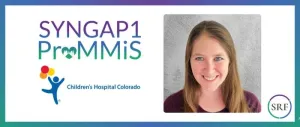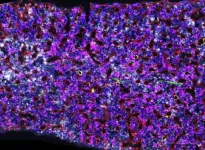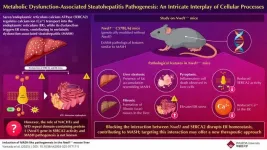(Press-News.org) Mill Valley, CA – March 11, 2025 – The SynGAP Research Fund (SRF) dba Cure SYNGAP1, a 501(c)(3) nonprofit organization, has awarded a $450,000 grant to Dr. Megan Abbott and the University of Colorado to establish a Clinical Research Center of Excellence for SYNGAP1-Related Disorders at Children’s Hospital Colorado (CHCO).
This initiative expands the already established Natural History Study to the SYNGAP1 Prospective Multidisciplinary Multisite Study (ProMMiS) while providing specialized care for individuals affected by SYNGAP1-related disorders (SRD).
Why We Supported This Project
SYNGAP1-related disorders (SRD) severely impact neurological development, leading to intellectual disabilities, epilepsy, autism spectrum disorder (ASD), and other complex challenges. Despite these profound effects, access to specialized care and clinical research opportunities remains limited. ProMMiS aims to bridge this gap by expanding expert care and advancing research. Establishing a second clinical site at CHCO strengthens this effort, ensuring more families receive high-quality, coordinated care while contributing to critical data collection for future treatments.
Furthermore, SRF is committed to accelerating both patient care and research. This grant supports Dr. Abbott’s initiative, which enhances access to specialized treatment and enriches the clinical data necessary for therapeutic development. By expanding ProMMiS, SRF is building the foundation for future clinical trials and ultimately, better outcomes for SYNGAP1 patients.
Developing a Clinical Outcome Measure
Dr. Abbott has a research interest in developing outcome measures for DEEs including SYNGAP1-related disorders (SRD). As part of this overarching interest, she plans to collect in the clinic an outcome measure previously developed for CDKL5 – the CDKL5 Clinical Severity Assessment, both clinician and caregiver reported. Collecting this measure in patients with SRD will provide valuable information on whether this outcome measure is appropriate and could be adapted to become an outcome measure for SRD.
To learn more about this project, please see Dr. Abbott’s presentation at the 2024 SRF SYNGAP1 Conference, available on YouTube.
Quotes from SRF and Clinical Leaders
“This project will require the PI to collaborate with another major academic institution (CHOP), develop a severity measure, and run a multidisciplinary clinic for patients with severe unmet need. It is ambitious and will be challenging. We are lucky we found someone in Dr. Abbott who has so much dedication, grace, and talent that there is no doubt she will succeed. The SRD community is grateful she took on this project,” says Mike Graglia, Founder of SRF.
“The first time I met Dr. Megan Abbott, I hoped she would work on SRD,” says Dr. Kathryn Helde, PhD, Chief Scientific Officer for SynGAP Research Fund. “I am beyond thrilled that she is bringing her experience with CDKL5 and other neurodevelopmental disorders to our families. SRF will succeed when Clinical Trials for disease-modifying treatments are successful. A key requirement is having multiple clinical sites, so this is an essential and exciting milestone.”
"I am thrilled to announce the launch of this multidisciplinary center of excellence for SYNGAP1,” Dr. Abbott stated. “Our mission is to accelerate research for the SYNGAP1 community by collecting high-quality natural history data and developing outcome measures that will support future disease-modifying therapy trials. But perhaps most importantly, we are deeply committed to providing specialized, compassionate care to SYNGAP1 patients and their families. Centers like this are only possible because of the dedication of the families and the unwavering support from the SynGAP Research Fund. We are profoundly grateful for their commitment, and I am excited to begin working with and supporting Syngapians and their families here in Colorado."
Family Donations Make Progress Possible
Advancing research and improving care for SYNGAP1 patients would not be possible without the dedication of families, advocates, and donors. Every contribution to SRF fuels initiatives like ProMMiS, accelerating the path toward meaningful treatments.
The establishment of this clinical site is a testament to the SYNGAP1 community’s commitment to progress. Through fundraising, advocacy, and participation in research, families are shaping the future of SYNGAP1 care. Their support enables researchers and clinicians to drive science forward, improve care models, and work toward life-changing therapies.
“This is a huge step forward, and it’s only happening because of the families who believe in this mission,” said Anthony Navarro, Resource Mobilization Director at SRF. “Every donation, every fundraiser, every effort to spread awareness—it's all adding up to real change. We’re not just hoping for better treatments; we’re actively building the infrastructure to make them possible. That’s what this grant represents, and I couldn’t be more excited for what comes next.”
About Dr. Megan Abbott
Dr. Megan Abbott is a pediatric epileptologist at Children’s Hospital Colorado, embarking on a career in clinical research focused on outcome measures in developmental and epileptic encephalopathies (DEEs) including SYNGAP1. She aims to establish new multidisciplinary clinics, generate gene-specific datasets, and devise outcome measures applicable to various DEE populations. Having grown up with a brother with special needs, she has both a personal and professional connection to working with rare disease families. She is excited to begin this work with SYNGAP1 with the hope that we can advance further towards clinical trial readiness and disease modifying therapies.
About SYNGAP1-Related Disorders (SRD)
SYNGAP1-related disorders (ICD-10 F78.A1) is a rare genetic disorder caused by variants on the SYNGAP1 gene that reduce SYNGAP1 protein levels. SRF has identified over 1,530 patients to date, and the number grows weekly. This protein acts as a regulator in the synapses (where neurons communicate with each other). When SYNGAP1 protein levels are too low, we see an increase in excitability in the synapses making it difficult for neurons to communicate effectively. This leads to many neurological issues seen in SYNGAP1 patients.
Symptoms of SRD include primarily neurological issues including autism spectrum disorder (ASD), intellectual disability, epilepsy, hypotonia (low muscle tone), gross and fine motor delays, global developmental delay, and visual abnormalities such as strabismus (crossed eyes) as well as gastrointestinal challenges and disordered sleep.
About SRF’s Seven Scientific Programs
SynGAP Research Fund has seven scientific programs. These programs reflect SRF’s urgency to develop disease modifying treatments. These include the following:
BTS - Basic and Translational Science
Purpose - Drug Repurposing
SMART - SYNGAP1 Missense Analysis, Research & Therapeutics
SBOM - SYNGAP1 Biomarkers & Endpoints
Facilitate - Develop and Share Research Tools and Reagents
SRDC - SYNGAP1-Related Disorders Characterization
ProMMiS: Prospective Multidisciplinary, Multisite Study for Clinical Excellence - Natural History Study at Multidisciplinary Clinics
This grant falls into the ProMMiS program. A highly curated prospective study, executed across multiple multidisciplinary clinics, is needed to describe “standard of care” when testing new treatments. Also builds future trial sites.
About the SynGAP Research Fund
The mission of the SynGAP Research Fund (SRF) dba Cure SYNGAP1 is to improve the quality of life for SYNGAP1 patients through the research and development of treatments, therapies, and support systems.
SRF was founded in the US in 2018 as a 501(c)(3) US public charity. There are sister organizations founded by local families in the UK in 2020, Europe (Netherlands) in 2022, as well as both Australia & Latin America (Colombia) in 2023.
Completely family-led, SRF is a leading funder of SYNGAP1 research having committed over $6.2 million in grants to date. SRF’s grant program awards one or two-year grants to investigators, physician residents, and clinicians interested in studying SYNGAP1. SRF grants are intended to help researchers explore novel ideas and answer open questions related to the clinical aspects of and therapies for SRD.
For more on SRF, visit cureSYNGAP1.org or follow @cureSYNGAP1 on LinkedIn, YouTube, Instagram, Facebook, TikTok, or X.
SRF is a member of FasterCures, COMBINEDBrain, Global Genes Foundation Alliance, Everylife Foundation Community Congress, Epilepsies Action Network, Personalized Medicine Coalition, Rare Epilepsy Network, Epilepsy Leadership Council, Alliance for Genetic Etiologies in Neurodevelopmental Disorders and Autism (AGENDA), California Action Link for Rare Diseases, American Brain Coalition, Genetic Alliance UK, Rare Disease UK, Syndromes Without a Name (SWAN UK), Jumpstart Program, Patient Worthy, Autism Brain Net, Innovation and Value Initiative, Rare Disease Diversity Coalition, Cambridge Rare Disease Network, Breaking Down Barriers, Rare-X, Mencap, IndoUSRare, and The World Orphan Drug Congress.
END
Dr. Megan Abbott and the University of Colorado awarded $450,000 establishing a Clinical Research Center of Excellence that will also serve as a second site for SYNGAP1 ProMMiS
New Clinical Research Center of Excellence to improve care for individuals with SYNGAP1-related disorders (SRD) while expanding the Natural History Study to a Prospective Multidisciplinary Multisite Study for SRD.
2025-03-11
ELSE PRESS RELEASES FROM THIS DATE:
Empire Discovery Institute appoints Dr. Ronald Newbold as Chief Executive Officer
2025-03-11
Rochester, NY – March 10, 2025 – Empire Discovery Institute (EDI), a leading non-profit drug discovery and development accelerator, is pleased to announce the appointment of Dr. Ronald Newbold as Chief Executive Officer (CEO).
Dr. Newbold, who joined EDI in 2021 as Chief Business Officer, has served as interim CEO since August 2022 and has been instrumental in driving the organization’s growth and success. Under his leadership, EDI has achieved significant milestones, including the growth of the Medicines Discovery ...
Douglas Hanahan, Ph.D., FAACR, honored with the 2025 Pezcoller Foundation-AACR International Award for Extraordinary Achievement in Cancer Research
2025-03-11
CHICAGO – The Pezcoller Foundation-American Association for Cancer Research (AACR) International Award for Extraordinary Achievement in Cancer Research will be presented to Douglas Hanahan, PhD, Fellow of the AACR Academy, during the AACR Annual Meeting 2025, to be held April 25-30 at the McCormick Place Convention Center in Chicago, Illinois.
Hanahan is the Ludwig Distinguished Scholar at the Lausanne Branch of the Ludwig Institute for Cancer Research. He is being recognized for his fundamental discoveries in cancer research that have had a far-reaching translational impact. Through the generation and characterization of innovative mouse models, Hanahan defined multistep ...
Mapping DNA's hidden switches: A methylation atlas
2025-03-11
Researchers have developed a comprehensive atlas that maps DNA methylation—a critical chemical modification governing gene activity—across 39 human cell types, revealing a complex landscape of epigenetic regulation. The study identified over 34,000 genomic regions exhibiting distinct ON/OFF methylation patterns at the two copies of the genome we inherited from our parents, a phenomenon known as allele-specific methylation. Some of these methylation changes are caused by genetic differences in genomic sequence of DNA, while others are due to parental imprinting—a ...
Beneficial genetic changes observed in regular blood donors
2025-03-11
Researchers at the Francis Crick Institute have identified genetic changes in blood stem cells from frequent blood donors that support the production of new, non-cancerous cells.
Understanding the differences in the mutations that accumulate in our blood stem cells as we age is important to understand how and why blood cancers develop and hopefully how to intervene before the onset of clinical symptoms.
As we age, stem cells in the bone marrow naturally accumulate mutations and with this, we see the emergence of clones, which are groups of blood cells ...
New research reveals psychological ‘booster shots’ can strengthen resistance to misinformation over time
2025-03-11
A new study has found that targeted psychological interventions can significantly enhance long-term resistance to misinformation. Dubbed “psychological booster shots,” these interventions improve memory retention and help individuals recognize and resist misleading information more effectively over time.
The study, published in Nature Communications, explores how different approaches, including text-based messages, videos, and online games, can inoculate people against misinformation. The researchers from the Universities of Oxford, Cambridge, Bristol, Potsdam and King’s College London conducted five large-scale experiments with over ...
Arctic sea ice loss drives drier weather over California and wetter over Spain and Portugal
2025-03-11
A study led by researchers from the Barcelona Institute for Global Health (ISGlobal), a centre supported by the "la Caixa" Foundation, has used a novel approach to unravel the influence of the loss of Arctic sea ice on the planet's climate, isolating it from other factors related to climate change.
The study, published in the journal Communications Earth and Environment, shows that on decadal timescales, the loss of Arctic ice favours the climate of the south-west of the United States - and California in particular - becoming drier on average, especially in winter. This phenomenon would also affect ...
Nwd1 gene deletion triggers MASH-like pathology in mice: a new scientific breakthrough
2025-03-11
Metabolic dysfunction-associated steatohepatitis (MASH) is a liver disease that progresses without symptoms and is associated with significant global public health concerns. It is prevalent in 30% of the population worldwide and poses a risk of advancing to cirrhosis and liver cancer. MASH is marked by lipid droplet accumulation in the liver, progressing from steatosis to inflammation and cell damage, ultimately leading to fibrosis, cirrhosis, and hepatocellular carcinoma. A clear understanding of cellular processes in MASH pathogenesis is essential for developing ...
First burials: Neanderthal and Homo sapiens interactions in the Mid-Middle Palaeolithic Levant
2025-03-11
The first-ever published research on Tinshemet Cave reveals that Neanderthals and Homo sapiens in the mid-Middle Paleolithic Levant not only coexisted but actively interacted, sharing technology, lifestyles, and burial customs. These interactions fostered cultural exchange, social complexity, and behavioral innovations, such as formal burial practices and the symbolic use of ochre for decoration. The findings suggest that human connections, rather than isolation, were key drivers of technological and cultural advancements, highlighting the Levant as a crucial crossroads in early human history.
Link to the images: https://drive.google.com/drive/folders/19p__omKCSSPkGBI3b8beF1QXqeRahGk1?usp=drive_link ...
Machine learning models fail to detect key health deteriorations, Virginia Tech research shows
2025-03-11
xIt would be greatly beneficial to physicians trying to save lives in intensive care units if they could be alerted when a patient’s condition rapidly deteriorates or shows vitals in highly abnormal ranges.
While current machine learning models are attempting to achieve that goal, a Virginia Tech study recently published in Communications Medicine shows that they are falling short with models for in-hospital mortality prediction, which refers to predicting the likelihood of a patient dying in the hospital, failing to recognize ...
Women with PVD often underdiagnosed & undertreated, highlighting need for more research
2025-03-11
Statement Highlights:
Peripheral vascular disease (PVD)—a condition affecting arteries, veins and the lymphatic systems throughout the body—has significant differences in incidence, risk factors, diagnosis, treatment and outcomes in women vs. men.
Women with PVD often experience subtle or atypical symptoms, which can lead to underdiagnosis or delay in diagnosis, and they are less likely to receive guideline-recommended treatments.
Targeted screening, tailored treatment strategies and increased representation of women in clinical trials are critical priorities to addressing these gaps ...
LAST 30 PRESS RELEASES:
ASU researchers to lead AAAS panel on water insecurity in the United States
ASU professor Anne Stone to present at AAAS Conference in Phoenix on ancient origins of modern disease
Proposals for exploring viruses and skin as the next experimental quantum frontiers share US$30,000 science award
ASU researchers showcase scalable tech solutions for older adults living alone with cognitive decline at AAAS 2026
Scientists identify smooth regional trends in fruit fly survival strategies
Antipathy toward snakes? Your parents likely talked you into that at an early age
Sylvester Cancer Tip Sheet for Feb. 2026
Online exposure to medical misinformation concentrated among older adults
Telehealth improves access to genetic services for adult survivors of childhood cancers
Outdated mortality benchmarks risk missing early signs of famine and delay recognizing mass starvation
Newly discovered bacterium converts carbon dioxide into chemicals using electricity
Flipping and reversing mini-proteins could improve disease treatment
Scientists reveal major hidden source of atmospheric nitrogen pollution in fragile lake basin
Biochar emerges as a powerful tool for soil carbon neutrality and climate mitigation
Tiny cell messengers show big promise for safer protein and gene delivery
AMS releases statement regarding the decision to rescind EPA’s 2009 Endangerment Finding
Parents’ alcohol and drug use influences their children’s consumption, research shows
Modular assembly of chiral nitrogen-bridged rings achieved by palladium-catalyzed diastereoselective and enantioselective cascade cyclization reactions
Promoting civic engagement
AMS Science Preview: Hurricane slowdown, school snow days
Deforestation in the Amazon raises the surface temperature by 3 °C during the dry season
Model more accurately maps the impact of frost on corn crops
How did humans develop sharp vision? Lab-grown retinas show likely answer
Sour grapes? Taste, experience of sour foods depends on individual consumer
At AAAS, professor Krystal Tsosie argues the future of science must be Indigenous-led
From the lab to the living room: Decoding Parkinson’s patients movements in the real world
Research advances in porous materials, as highlighted in the 2025 Nobel Prize in Chemistry
Sally C. Morton, executive vice president of ASU Knowledge Enterprise, presents a bold and practical framework for moving research from discovery to real-world impact
Biochemical parameters in patients with diabetic nephropathy versus individuals with diabetes alone, non-diabetic nephropathy, and healthy controls
Muscular strength and mortality in women ages 63 to 99
[Press-News.org] Dr. Megan Abbott and the University of Colorado awarded $450,000 establishing a Clinical Research Center of Excellence that will also serve as a second site for SYNGAP1 ProMMiSNew Clinical Research Center of Excellence to improve care for individuals with SYNGAP1-related disorders (SRD) while expanding the Natural History Study to a Prospective Multidisciplinary Multisite Study for SRD.




